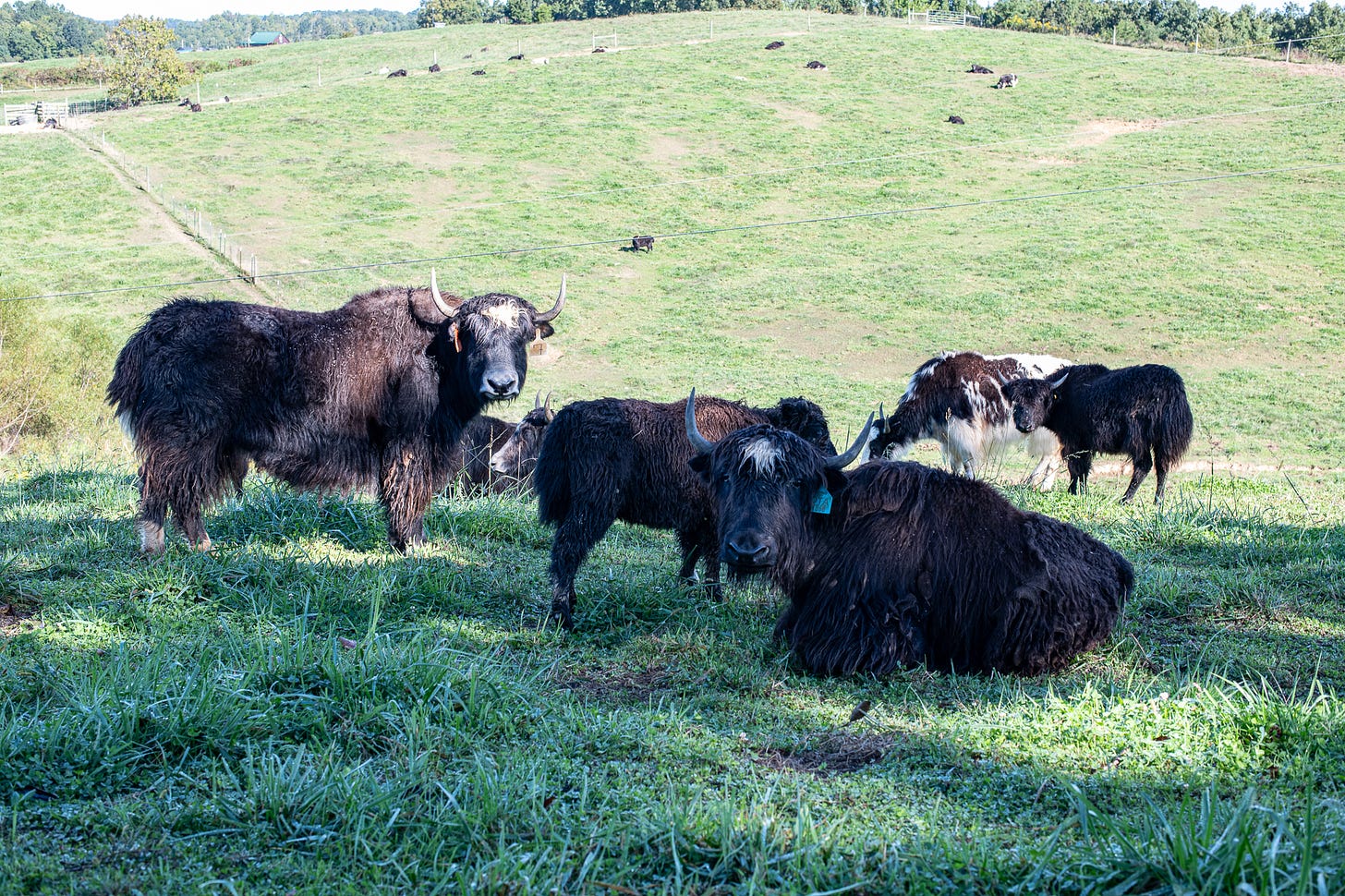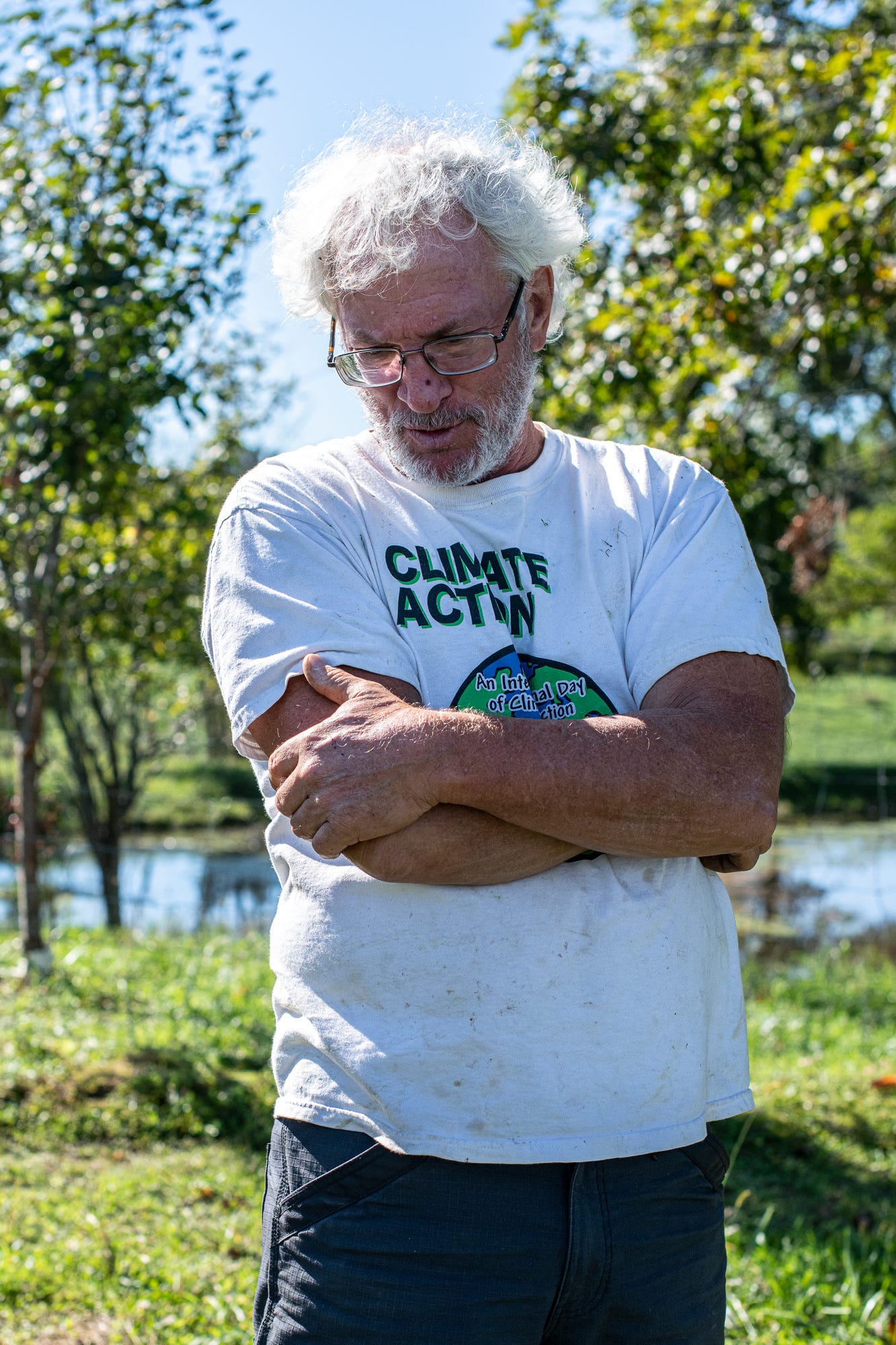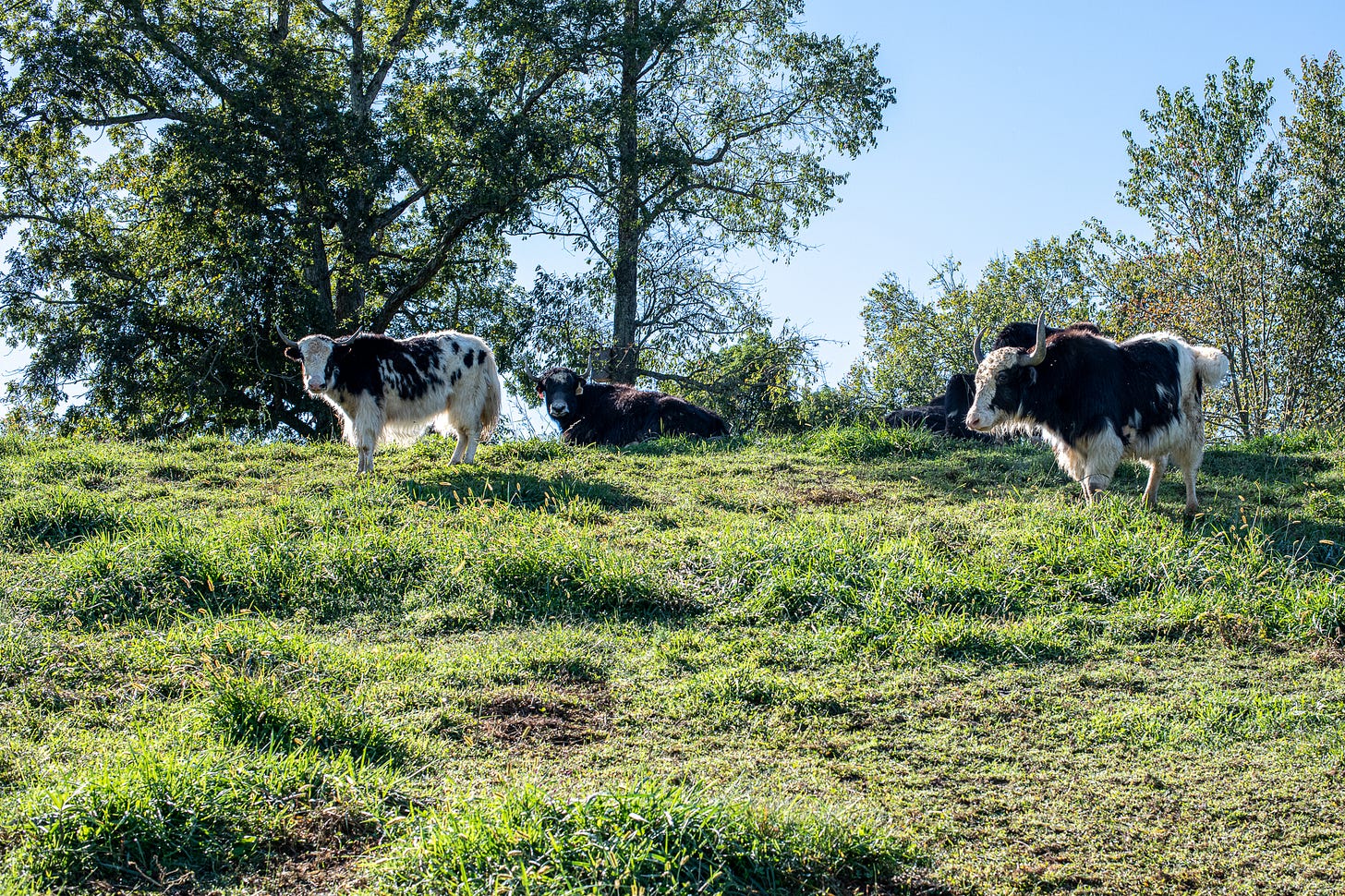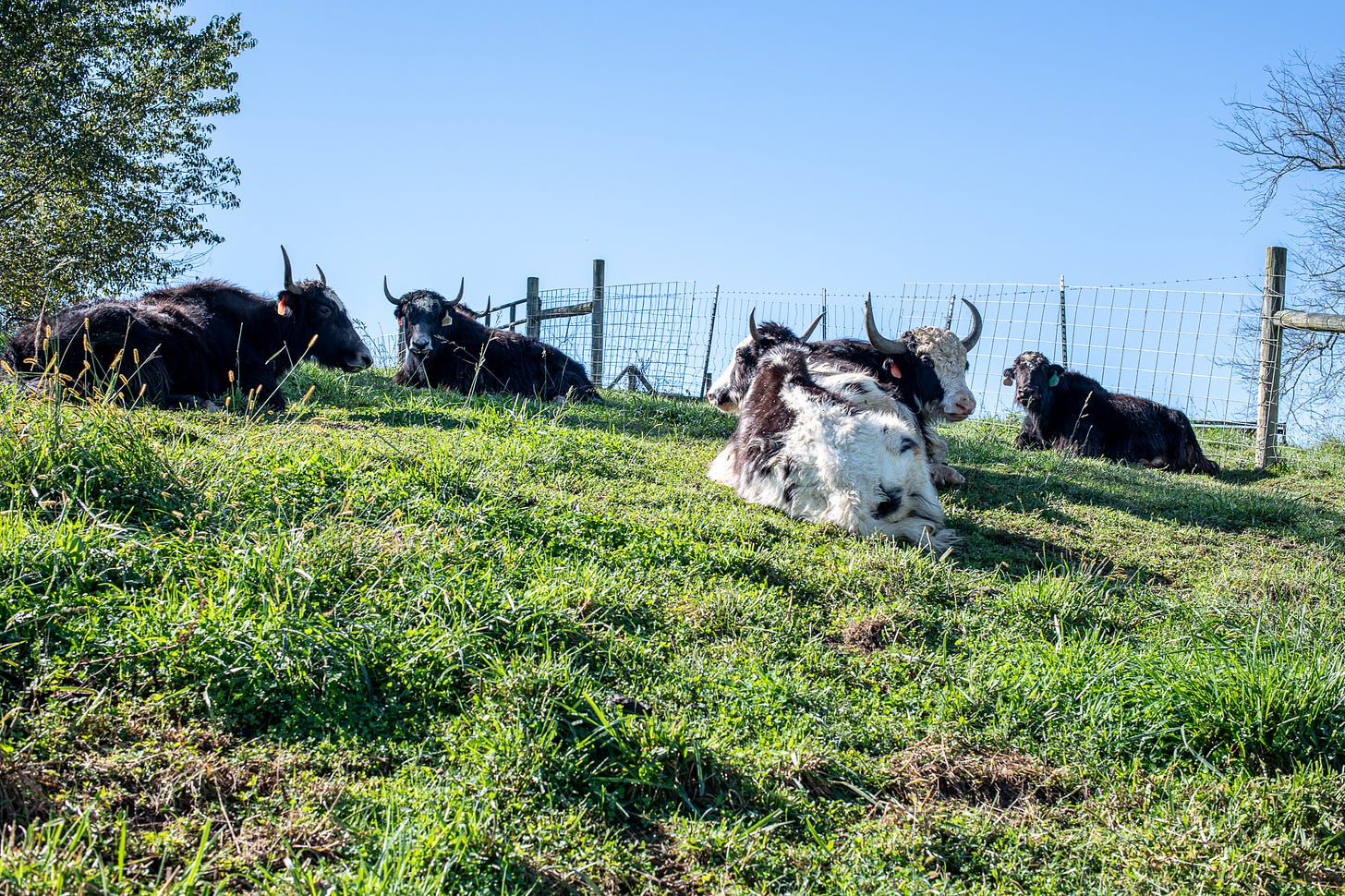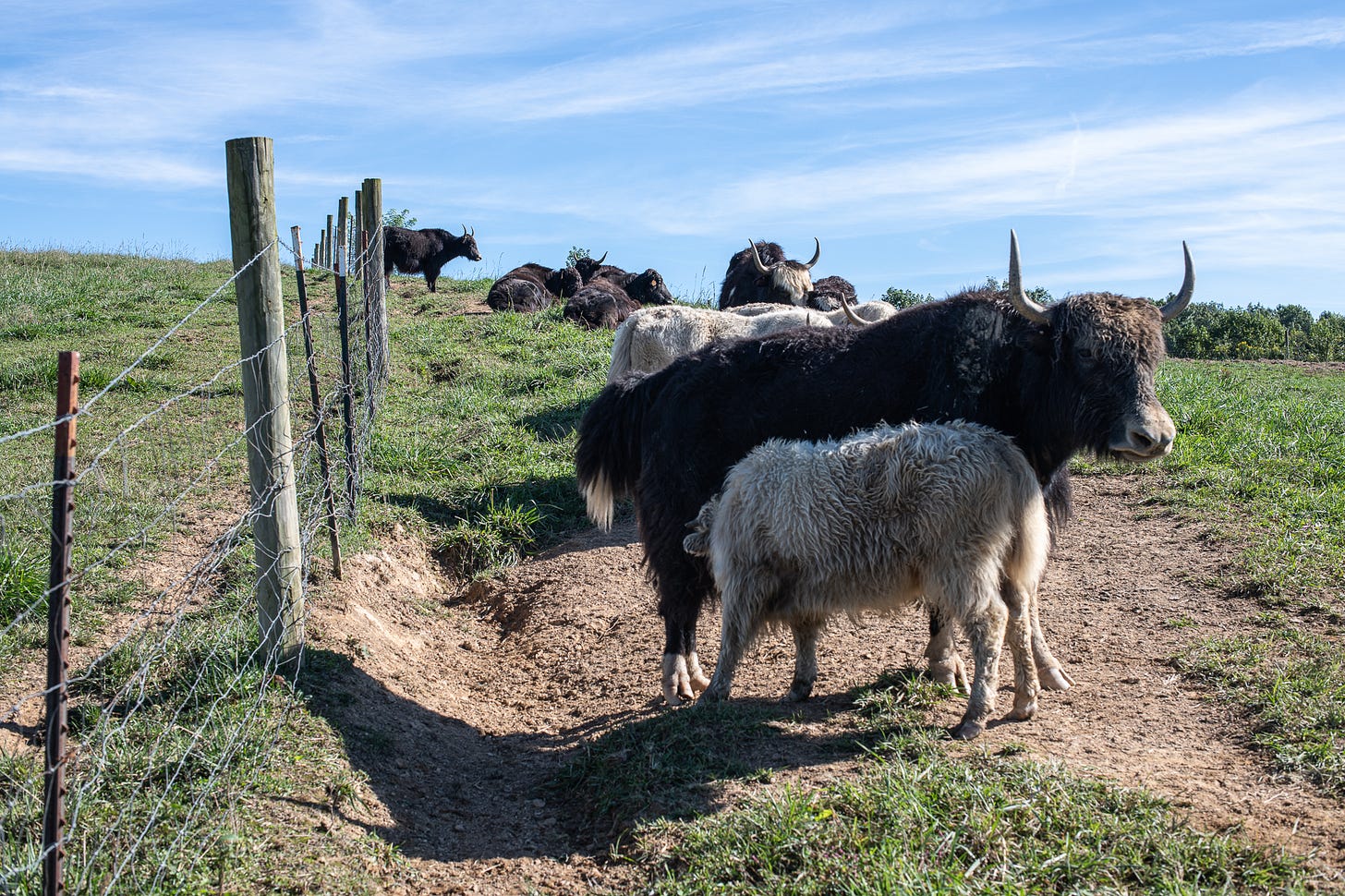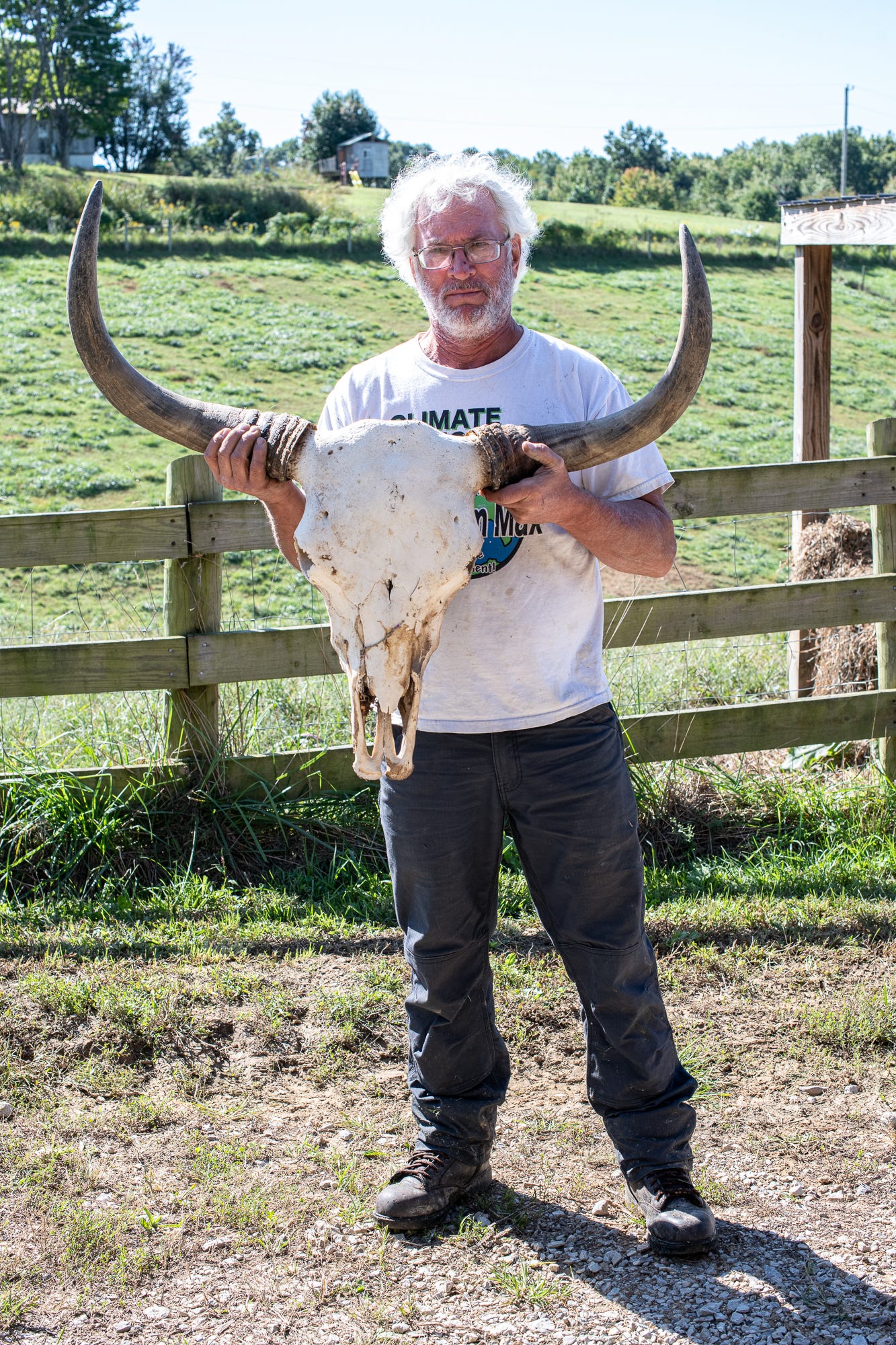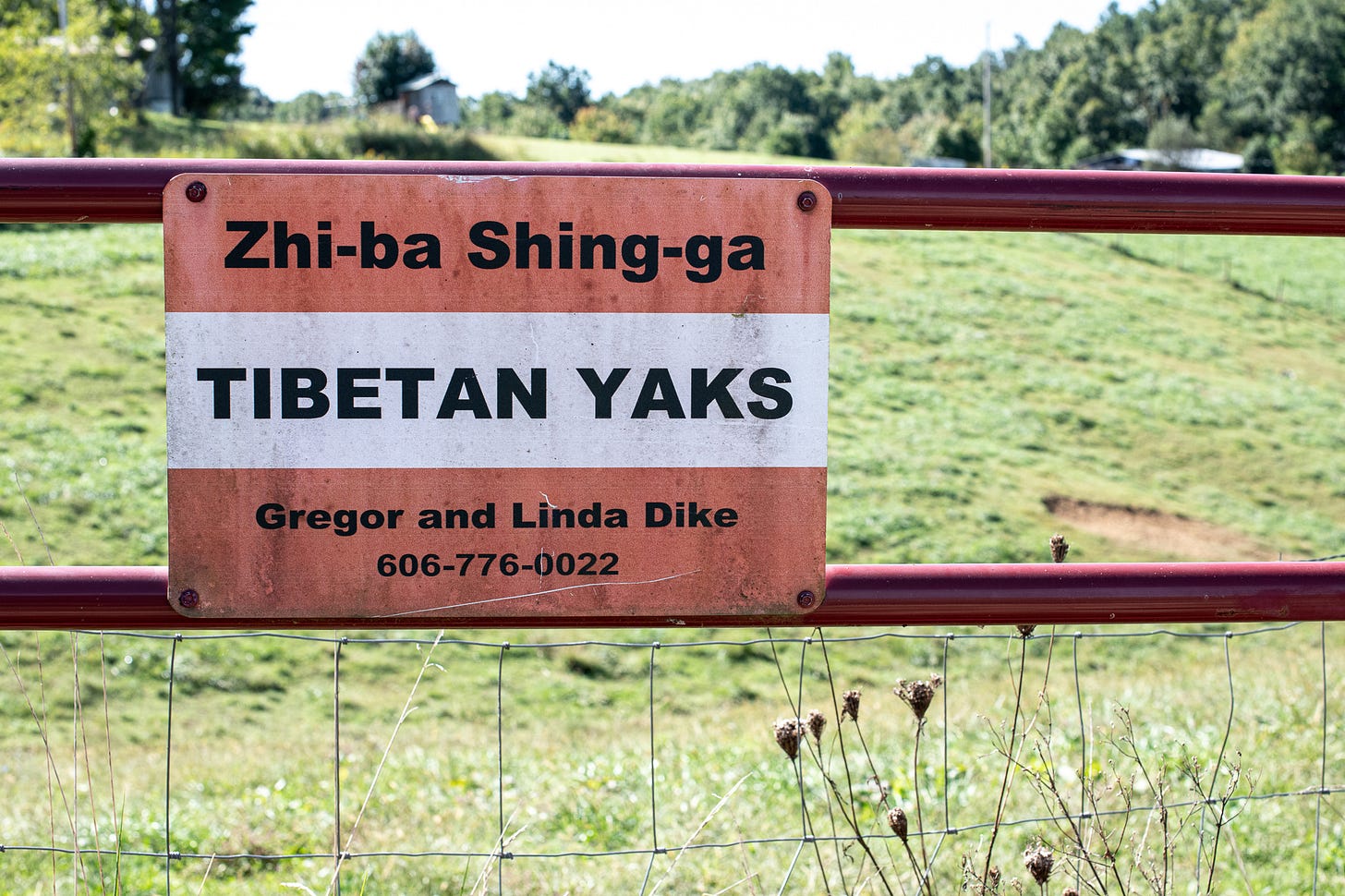The Yak Man of Menifee County
More environmentally-friendly and cost-effective than beef cattle, Gregor Dike sees a new home for yaks in Eastern Kentucky.
“They act like teenagers. Seriously. Yaks act just like teenagers.”
Gregor Dike doesn’t crack the punchline smile I was expecting after delivering this line but instead shrugs, arms folded into the easily recognizable stance of parental resignation.
I didn’t know what to expect exactly when I arrived at Zhi-Ba Shinga Yaks in Menifee County to see these Himalayan-native bovines in their curious new Appalachian digs, but beyond the raspberry patches and past the marled Great Dane sprinting down the road at thoroughbred-in-the-home-stretch speed (“She can run 20 miles per hour,” Dike mused) the air around the yak pasture settled in a way that was something close to, well, calm.
I’d also be lying if I said I knew what a yak looked like, exactly, before coming. YouTube videos, sure, but I had expected a creature with—I’ll just be honest here—the dull heft of a cow. Jersey, Angus, whatever: you always encounter the same sort of lumbering blandness whenever you enter a cattle-filled field or stockyard. (Sorry, cows.)
Instead, I found a much more diminutive, Muppet-looking creature in the yak. All had long, Pantene Pro-V commercial-worthy hair—some black, some white, some bicolored—that seemed practically Artemis-like in its lushness and wildness. And the dichotomy between the yaks’ triumphant, arched horns and sagacious, reflecting pool eyes only made the wise feeling from the animal nest even deeper in my gut: These are creatures with a calmness hewn through seeing centuries of humans fall and rise and fall again—the same way we will, too.
An operation unto itself as the first and only yak ranch in Eastern Kentucky, Zhi-Ba Shinga breeds and raises yaks, sells meat to consumers and—on a larger scale—serves as a successful experiment meant to show farmers across the region that yaks are an environmentally-friendly, cost-effective alternative to raising beef cattle. People don’t totally believe that, yet, but the rumblings are there. There’s even a Yak Husbandry Research Conference planned at Morehead State University next month. (More on that Thursday.)
Today, we’re going to take a script-like story format because I want you to envision yourself there with us: yaks speckling the sharp hills off of Cub Run Road; matted clumps of mud-caked yak hair beneath our feet like bad toupees; a vulture figure-eighting overhead the only thing akin to a breeze on a smidge-too-bright late September morning.
Greg and I are tucked halfway under the canopy of a single unremarkable tree, which is providing an inadequate, but merciful, amount of shade coverage from the 10 a.m. sun. (“Climate change—sun didn’t used to be this bright at 10 a.m.,” Greg mutters.) As we talk, his sight constantly trains on my photographer combing through the fields among the yaks, rarely breaking his forward-gaze to make eye-contact with me. This was partially out of fear that a goring incident might occur, I’m sure, but also because Greg isn’t interested in making an animated sales pitch to some reporter about the promise of yak glory for Eastern Kentucky or mythologizing a yak grift: He’s really and truly reverent about the creatures and, I think, just likes to look at them.
Fair enough.
And, scene!
Greg Dike: I'm originally from New York.
Sarah Baird: Yeah, you didn't strike me as somebody from here. [Ed. note: The first time I saw Greg, he was wearing a long, Western-style duster coat a la Deadwood while selling yak jerky at a farmers’ market.]
GD: Back in the mid-1990s, I moved to New Orleans and lived there just about nine years.
SB: Oh! I lived there about seven years before moving home.
GD: I got tired of it, and that's how I ended up in Kentucky. I was looking for a job, and I had applied for a job at the Red Bird Mission. And in those days, you couldn't get in unless you knew somebody at the Board of Global Ministry. But they had their cell phone number [listed] so I pulled out a cell phone and said, “You need anybody?” And he goes, “Yeah.” So, that was it—that's what got me to get Kentucky. I worked there a couple years, and then taught some, and then worked in the ER at UK awhile, and then moved over to Morehead and worked there, which got me to here. And then I was in Northern India.
SB: Oh, really? Northern India?
GD: Yeah, I met some Tibetan refugees. They showed me about the yaks. Then I got the yaks; then I got the farm.
SB: You got the yaks before the farm for the yaks? Where were the yaks staying?
GD: We live about eight miles from here. We don’t live here. We had a couple of acres and a pasture at that point.
SB: What was the motivation to get yaks for your Eastern Kentucky farm?
GD: Well, it was the sales pitch. I mean, it sounded really interesting. So, I bought one, and realized you had to have at least two, because they'll see you as a predator. They need that sense of companionship and safety. I got a couple more, and then I was like, “Not enough land here.” Then I'd been out west and bought some more. They hadn't come yet, so I thought, “I better really find some land.” I found this old farm and tore down the barn and put up other things—fencing and stuff. I’m still trying to upgrade it.
SB: I love it here. How many yaks do you have now?
GD: There about a hundred here right now.
SB: Is there a certain “yak personality”?
GD: Teenagers.
SB: Teenagers?
GD: They're smart. No, really. They're devious like a teenager—or can be. They know exactly what you want. They'll make you work for it.
SB: Do they all have different personalities in spite of being teenagers? This one's docile, this one's goth—
GD: I mean, this gang here [points to the closest grouping of yaks] they've been on somebody else's farm. He couldn't handle them—he didn't have time for them—so he brought them back. They were just dying there. So, this gang is just like, “I don't care about you, you don't care about me, I'm not going to do anything to you. Just don't bother me.” And that's usually the way most of them are. But when you start to work with them, you get to know them.
SB: Do you have a favorite yak?
GD: My favorite's actually in Colorado, so…
SB: Oh, really?
GD: It was part of a deal. She was a bottle-fed one—and then she was basically a dog. I mean, she'd be like on your fingers right now [sticks out hand to indicate suckling] even though she'd be this [baby yak-sized] tall. She's just really sweet. I've got some different favorites, but they're down in the other field.
SB: Right, what about the ones that are still here?
GD: I like the white ones. Either that one or the one that's over there—the two larger ones [pointing]—they're a little over a year old. And one of the babies, I think it's the one along the fence line that's like a little lump, it’s going out to Wyoming in a week to Jeffree Star.
SB: Oh, wow.
[Ed. note: For those unfamiliar, Jeffree Star is an infamous and controversial YouTube make-up artist and performer with an eponymous cosmetic brand and a net worth of something right around $150 million. During the pandemic, he relocated from his over-the-top mansion in Los Angeles to Casper, Wyoming and began raising, yes, yaks on Star Yak Ranch. ]
GD: So, taking them out—that'll be a trip.
SB: What's different about raising yaks than raising regular beef cattle? [At this point, a rustling ensues over by the barn where my toddler is merrily clanging around among the cowpies, er, yakpies. We both glance up.]
GD: I was waiting to see a yak come through.
SB: Oh no, it’s just my toddler. Sorry!
GD, unphased: The yaks are smart. I mean, I've had beef cattle before for fun and I like them, but the yaks are much more intelligent and have a real personality. They also have a sense of wisdom about them that, I mean, when you're around them, some you’re just like, “This must be a reincarnated Buddhist or something.” It’s the way they act and the way they look at you and observe things. People who have them, there's a real kind of respect to the animals just because of that sort of ancientness about them. I mean, some people will get the yaks to the point where they'll lie in the fields for them so they can trim their toes. If you work with them, you can do whatever you want with them. You can ride them. In Mongolia, they have an annual race. You can look at people playing polo on them on YouTube. So, you could pretty well do anything.
SB: Wow. Is it a small community in the United States? I mean, obviously it's mostly out west.
GD: It's small. There are only about 7,500 yaks total in the United States, so it's probably 200 farms. Some people have two yaks, and some have 600.
SB: How has been the response been here in Kentucky?
GD: Curious. I mean, people in the area will drive around to see what's going on. They’ll look at the babies and they'll stop to take pictures and stuff. That sort of thing.
SB: Do you think that you’ll inspire more yak ranches in Appalachian Kentucky?
GD: Slowly. But, well, yeah, that was part of the plan because I think they would fit well. They require less land than beef cattle do. So, from an environmental and cost standpoint, they're more efficient. You don't need to feed them any grain. You can finish them on grass. They take longer to mature, and they don't grow up to be 2,000 pounds, but the meat is healthier than your beef.
SB: You had mentioned that—
GD: It has Omega-3 oil in it, which is kind of unusual.
SB: That's really unusual for a critter so big.
GD: And yak is high protein—very lean. It's like, say, 97, 98 percent lean. You have to be real careful cooking it because it'll dry out.
[Greg looks towards the sky in the distance and points, his brow furrowing]
GD: Just watching the vultures and seeing what they think they see. We think we had a mountain lion here the other day. It killed a calf.
SB: Oh no!
GD: And I think that's because the bulls knocked part of the fence down. All the herd was through the fence and the calf was left. But a yak will take on a mountain lion.
SB: Really?
GD: The adults will.
SB: What about when the yaks lock horns? Is that aggressive or is it playful? Or is it a teenager thing so…both?
GD: No, it's a game. They'll play for fun. The bulls will do the superiority thing, but if you watch them, they're not out to hurt each other. They will actually lock horns, and you think they're going to poke each other's eye out because the horns curve around. But the time it gets dangerous is if a third one shows up and hit them on the side.
[Greg’s eyes migrate slowly across the field where my photographer is now only a smudge in the distance]
GD: I was just looking to see who's in the field, yak-wise. There's nobody's that's going to be a hard time. Because they recognize people. So, they'll react—they'll act differently—with strangers around. Usually they’ll just ignore [them] like a teenager.
SB: Are they “too cool” for new people to join their yak clique or…?
GD: Yeah. Or, I mean, they could put on a show for them. They may do a false charge or something. Or they'll, like, jump at you for three or four feet and see what you're going to do. But you could scream at them usually and they don't care. That's a pretty docile gang.
SB: Are hills a benefit for yaks? Would the more mountainous regions of Eastern Kentucky be better for yaks than, say, the flatter land of Central Kentucky?
GD: Yes. You put a yak in a flat field and put a little mound of dirt in the center, they will stand on it. And that's just from experience, watching my first one do it. It really depends on the people. I think for small acreage farmers, it makes sense for Eastern Kentucky.
SB: How do yaks interact with other animals, like dogs?
GD: Small dogs they don't seem to mind, but bigger dogs they see as a predator. Some will really go after it like a predator. Others will say, “I know it's not going to hurt me, but I'm going to chase it and have fun with it and scare the daylights out of it.” When we first got yaks, we had a Pyrenees and a Saint Bernard. We came in the field, and the Pyrenees was right across from it with the Saint Bernard sneaking around the edge. And I looked over and two yaks—a mother and a daughter—are just horns down. [He makes horns with his hands] Full steam at the Pyrenees. The first one hit it and threw it in the air, and the next one hit it and threw it again!
SB: Oh my god!
GD: The interesting thing is that they'll turn their head and not hit with a horn.
SB: Huh, so kind of like a side headbutt?
GD: No, it'll be—[Greg headbutts the air with the front, flat part of his forehead, like a yak would do]
SB: Oh, like this. [mimicking the headbutt] Okay. [Deep breath] Okay.
GD: No, I mean it hurts, but they don't spear them. I figure if they were going to kill it, they would just take it with a horn. So, there’s a certain understanding. They're aware of what they’re doing. But it's interesting. They don't like cats—and they'd chase a cat—but a rabbit will run right under them and they don't care. It's just very odd what seems to pique their interest. Maybe it’s more boredom and something to do.
SB: What about larger predators like the mountain lion you mentioned?
GD: They'll take on a coyote without any problem. But mountain lions are hard, because they get [knocked over] on their back and that's the danger. I know a guy out west who was watching through binoculars, and his yaks were all circled up like the muskox will do. And the bull went out, and he looked over, and there was a big grizzly bear up there.
SB: Oh god.
GD: And the bull went to the bear.
SB: Oh god!
GD: And came back.
SB: …Wow.
GD: So, I mean, they will take things on. The guy I bought my first yak from in Ohio got rid of his. And he said the minute he got rid of them, all the bobcats and everything came in to kill his chickens and stuff. As long as the yaks were there, basically most animals stayed away.
[Photographer returns from the field]
Photographer: Well, I didn’t get charged.
GD, laughing: Aw, if you didn't get charged, what's the fun?
We’ll be back Thursday with the second part of our Yak Week discussion with Greg Dike, including strange policies at the Kentucky State Fair, yak insemination, cross-breeding efforts with Angus cattle and even an original recipe for cooking ground yak meat.
You know the old saying, friends don’t let friends miss out on yak recipes:
All Photos: Will Major




